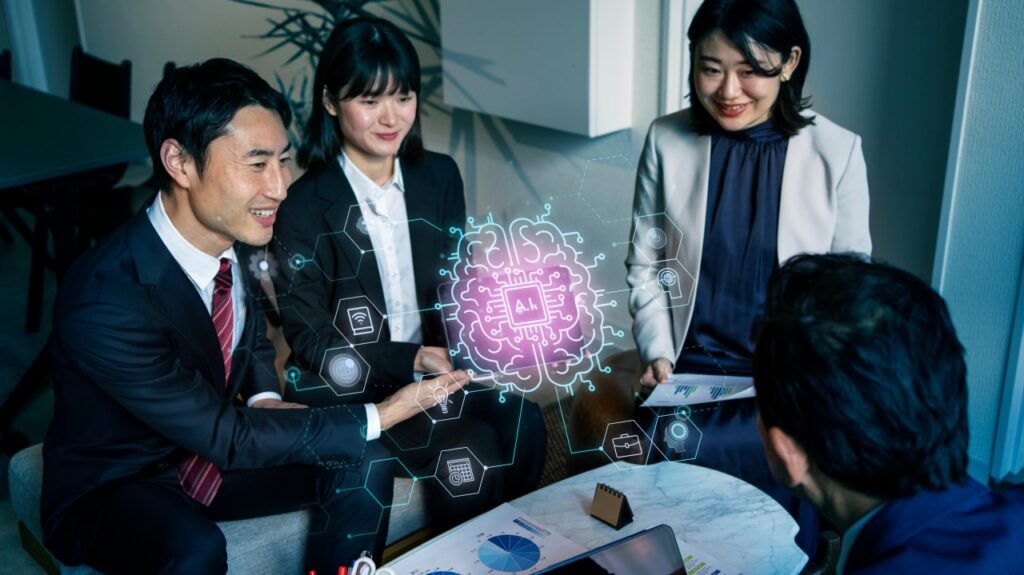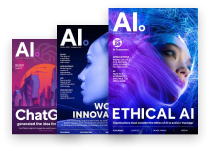Do you need a quick virtual tour guide? Or planning your best friend’s wedding? Are you struggling with a math problem or need help with the coding?
For all these problems and more, we have AI to assist us.
Artificial intelligence has become an integral part of our daily lives. So much so that we turn towards it whenever we need any help. It feels kind of like a plot of a superhero movie. If AI were a superhero, it would have a green cape!

Our perception of AI has undergone a significant shift over the past year, thanks to the emergence of generative AI benefits like Chat GPT, Gemini, and Claude. While AI is often viewed as a threat to livelihoods, it also has the potential to be a transformative superpower that amplifies human capabilities in the workplace. By learning to work alongside AI, individuals can position themselves for career advancement and long-term success!
AI is like having an intelligent virtual assistant that helps you shine at work. It provides customized features that make our jobs easier than ever. Think about it – AI takes care of those boring repetitive tasks, crunches tons of data in no time, and even gives us custom tips and tricks. It’s like magic! It gives us spare time so we can focus on the bigger picture, helps us analyze vast amounts of data, and provides insights and executive innovation ideas we never had time for before!
Human and AI- A Powerful Union
AI can learn, decide, and predict outcomes all on its own. It goes beyond traditional automation by incorporating adaptive learning, decision-making, and predictive capabilities. By harnessing the power of machine learning, natural language processing, and neural networks, AI systems can analyze data, identify patterns (that are impossible to detect by humans), and make informed decisions without needing human input.

As Iron Man said, “The only way to win is together,” Humans and AI can become powerful! (beyond one’s imagination)
It can predict and solve problems before they even arise, allocate resources efficiently, and even fix system glitches with minimal downtime. As AI continues to evolve, IT teams get a major boost with AI-powered solutions, which complement their skills and free them up from routine tasks. IT professionals can focus on other major projects, and amalgamate innovation and strategy, revolutionizing the role of IT in organizations while setting new standards for operational excellence and business agility.
Boosting IT Agility Through MLOps, and Managed Services
Gen AI is the next step in this journey, building on the great practices we’ve established to make IT more agile and scalable. As a result, new and exciting developer roles are emerging, like MLOps (machine learning operations), Data Ops, and platform engineering, which are expected to grow by 20% through 2027! Meanwhile, traditional roles are evolving to be more efficient, allowing IT departments to do more with less. It’s like what we saw with the cloud, where new technologies brought new opportunities and challenges.
AI will create around 97 million new jobs, including roles focused on AI development and maintenance according to the prediction of THE WORLD ECONOMIC FORUM
It is also leveraging organizations to invest in upscaling their existing talent, so they can thrive in this new era!
Enhancing the Game with AIOps
AIOps, which stands for artificial intelligence for IT operations, became part of IT vocabulary in 2016. Gartner introduced the term AIOps to describe how data analytics was creating new efficiencies for IT operations teams. AIOps applies advanced analytics, specifically machine learning (ML) and artificial intelligence (AI), to automate operations.
This automation allows IT operations teams to work at the pace required by modern businesses. Recent technological advances like distributed architectures, multi-clouds, containers, and micro-services have led to complex, multi-dimensional data flows. This complexity creates excessive noise and makes it challenging for IT teams to identify and resolve service incidents effectively.
Key Features of the AIOps are:
1. Enhanced reliability and availability
2. Lower operating costs
3. Accelerated digital transformation
4. Improved employee productivity and experience
How Gen AI is Helping the IT Sector?

Reducing Mundane Task: Gen AI has revolutionized the way IT teams manage mundane and repetitive tasks, such as software updates, system monitoring, and incident management. With minimal human intervention, these tasks can now be handled seamlessly, resulting in minimized errors and enhanced productivity.
Automation reduces the likelihood of human error, ensuring that tasks are completed accurately and efficiently, and by automating routine tasks, IT staff can focus on more strategic activities, significantly reducing the time spent on these tasks!
Detecting errors: Gen AI can automatically detect and troubleshoot common issues, ensuring that systems remain operational with minimal downtime, enabling IT staff to shift from reactive to proactive tasks and focus on planning and implementing innovative solutions to drive their organizations forward.
Accuracy: It can predict potential system failures or security breaches, enabling IT teams to take preemptive measures to protect critical infrastructure. Through machine learning algorithms, these systems continuously improve their accuracy and efficiency, learning from past incidents and responses to deliver smarter outcomes over time, allowing IT teams to optimize system performance and enhance user experiences.
In conclusion, As we navigate the future of IT, it’s evident that the path forward is marked by both challenges and opportunities, according to IDC, the market for General AI (Gen AI) is projected to reach $151 billion by 2027, with a compound annual growth rate (CAGR) of 71%.
Companies are getting a major upgrade by making their teams AI-ready and bringing AI and generative AI (Gen AI) into their daily operations. helps them work more efficiently, automate tasks, and stay ahead of the curve in today’s fast-paced business world. For instance, Wiprohas trained nearly 200,000 employees in basic AI principles and more than 20,000 in advanced content.
As Anne Lee Senior Technology Advisor, Technology Leadership Office says “In 10 years, we might see AI super-intelligence that outperforms humans in everything it does.”





